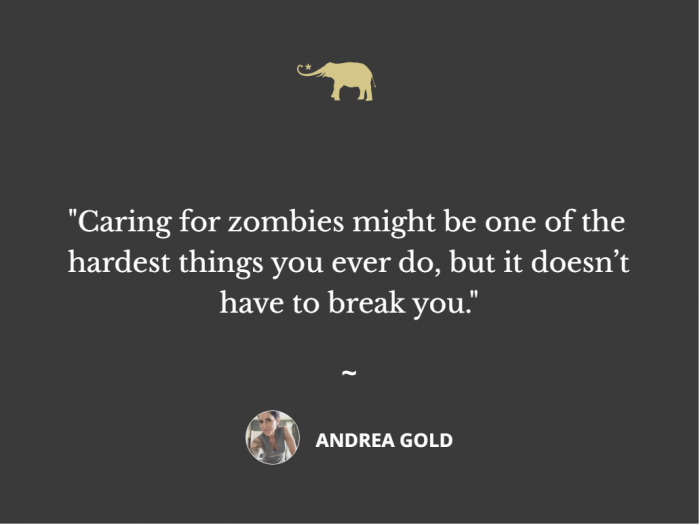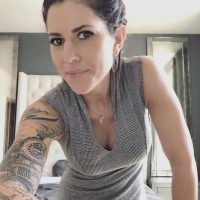It’s been a rough few years. I’m not going to lie.
I consider myself as tough as they come and this almost broke me.
My father’s descent was a long and slow one. He was blissfully ignorant to his 10-year decline into madness. For his whole life, he lived for his work and it defined who he was as a person. At the memory care facility, he would often wander into staff meetings and pull up a seat at the table to offer his “advice,” but have to leave shortly after arrival to take a call on the calculator he carried in his pocket. They accepted his help and even used him in interviews to evaluate new employees.
He was a proud and quite private man when he was still a human, but we watched him become fearful of anything outside of his routine, start to distrust people he didn’t know, and fall often, refusing the aid of a wheelchair when his balance began to falter. Each time a new aspect of the disease reared its unforgiving and ugly head, we watched a piece of him die and fade away.
With Alzheimer’s disease, they call it the slow goodbye because you can see the death of one character trait at a time, and you grieve the loss of the piece with every step they take toward the darkness. You know it’s coming, but it doesn’t matter. It hurts every time there is a change. There is a physical difference in their eyes, too. The twinkle starts to fade, and you see them looking at you but not seeing you.
By the end, he was in a small hospice care home so he could be monitored around the clock. He didn’t give into using the wheelchair so much as just stopped remembering to try and get up. I remember taking him for a walk around the neighborhood one day, pushing him in his chair and picking flowers for him. I handed him the small bouquet at the driveway but by the time we got to the door, he was holding the stems but all the flowers were gone and I could see him chewing. I laughed and tried to get him to spit out the flowers, to which he swallowed quickly and showed me his empty hands and mouth like the ending to a magic trick.
He always tried to make me laugh, and in moments like these, you feel a tiny reflection of them refracting into consciousness. It warmed my heart as I simultaneously hoped I hadn’t just poisoned my father with unknown flora.
My mother had been his primary caregiver and was, of course, constantly anxious and overwhelmed.
She was always that way, but this was definitely the worst I had seen. In the last few months before he passed, she started forgetting words for things. Sometimes she would say the wrong word in its place and it scared her. She journaled prolifically, and in reading the entries later, she often feared turning into my father throughout his illness.
When you are around someone who does dementia things, you often catch yourself doing small little things too and are sure your fate will be the same. You lose your keys once and are positive you are losing your mind. Everyone told her it was just stress and she needed to take better care of herself, but the trauma of it all was seeping through her consciousness as she held on for my father.
Within a month after he died, the floodgates opened and what spilled out was her ability to use words. And out they went, into the ether never to be found again. She was officially diagnosed with Primary Progressive Aphasia. It was a rare but more aggressive form of dementia. The pattern is the same, but unfortunately for her, it starts in a different part of the brain, the part that controls speech, communication, and motor function.
For the first year of her diagnosis, she was incredibly aware of what was happening to her and felt everything, and every progression into losing her mind and her abilities to be a human. It was the dementia equivalent to being awake on the operating table. We talked often about the meaning of life, living in the moment, and appreciating what we have today—because today is all that exists. It was a shallow comfort of the foreboding and imminent future and we prayed for the day she would not know what was happening anymore.
She was in the horrible middle ground of being too far gone to be independent but wanting desperately to maintain human connection to her friends and family, to drive, and go for walks outside. In her mind, she was very much still herself, but unable to operate a car or speak what was on her mind. In the unforgiving nature of irony within this disease, she had hoped to start writing finally after my dad passed, and dreamed of penning her own novel. Instead, she was now taunted by the words quite literally escaping her.
She approached me one day and said she had a crush on the man who worked in the memory care facility. He came into her room and kissed her. “Are you sure?” I asked. She had begun to replace words with random ones when she could not fill the gaps herself. So things like “he talked to me” could easily be replaced with “he kissed me.” Both are positive interactions; however, the devil is indeed in the details. After much questioning, it sounded like the potential for foul play and I had to have an emergency meeting with the director. He assured me that residents do get confused sometimes, and he was sure it was fine. He would not have the man go to her room for any maintenance until the issue was resolved, so I shouldn’t worry. They brought in a third-party investigative team and interviewed several staff members and my mother. After an arduous two-week process, they decided my mother was no longer connected with reality and had probably imagined it, made it up, or had the situation confused. There was nothing more I could do. It was her word against his, and the words were not on her side. While I got her out of there and transferred to a better facility as soon as possible, I’ll never really know the real story.
In her new digs, the people were nice, but like all the facilities we had dealt with before, the caregivers are overworked and underpaid. They seem to get frustrated easily and never quite operate as delicately or as patiently as what you would do, but you love them all the same and on a level few will ever understand. Their undying dedication to the people they look after will change your faith in humanity.
Soon after moving in, she started to look past me when I would come to visit, and it wasn’t until I called out to her that I would see her face light up with recognition and she would give me the kind of hug that begged for freedom. Freedom from the facility, or maybe freedom from the confines of a body that seemed to be betraying her. She went to the hospital often for falls and other things. Nurses there always yelled louder when she seemed confused, hoping to get a better response, and I would have to explain every time that she was, in fact, not deaf, but couldn’t understand what was happening, no matter how loud you explained it. She would fight to get out of the bed, fight to get the heart monitor off her finger, and fight to get the wires off her chest nonstop. She would claw and scratch at my arms to let her get up out of the bed. It was exhausting for both of us and it broke my heart every time.
By the end, she would recognize me for brief moments then feared me as she did most others. She wandered around, not wanting to sit or eat or drink with no life left in her eyes.
Others there looked the same. It always reminded me of zombies. Empty shells of who they used to be, void of purpose or direction. I often wondered at what point of consciousness does one still retain the “self,” that part that makes you, well, human?
There were only glimpses by the end of the person she once was. One morning, a mere four years after her diagnosis, she just didn’t get up out of bed. She was unresponsive and they put her on immediate hospice care. They told us the end was near, and sure enough, a week later, she was gone. The day she died, I had missed her by 20 minutes. I had never seen a dead body before that morning. I was shocked at my own relief to finally see her at peace. The night before, she had been struggling to breathe, heavily medicated on painkillers, and I could hear a crackling in her lungs. Her skin looked grey; her bottom teeth protruded out of her mouth. She would only occasionally open her eyes, but they would roll back in her head as she gasped for air, before returning to her labored breathing. I will always be tormented by the memory of that last night I saw her alive.
In the morning, though, there was silence. Her body was warm and still. I laid my head on her stomach and for the first time, I cried. It was my turn for the floodgates to open, as the one who’d had to hold strong for her. I had been her caregiver for the last four years. Luckily for me, no disease came flowing out, thank God, only pent-up emotions.
So much of my life had revolved around her, I worried about every decision, every incoming phone call, and then—nothing. It felt like standing in a black hole, like standing in a void where you scream and no sound comes out. In fact, it felt like a deafening silence. There is a relief, but it’s not as cathartic as you hope for. It’s complicated. You believe that you have done most of your grieving already and you are ready, but you are never ready. It’s never what you think. It’s grey. There is no black and white in death, which, to me, seems ironic in its finality.
Her sister was recently diagnosed with dementia as well and is beginning her own journey. My heart breaks for her husband and children. It’s not easy for anyone.
My fear for my own longevity and well-being has, of course, been tested as well. This experience has led me into a new career focusing on mental health as I discover how much control we actually do have in our own fate. The importance of managing stress, sleep, diet, and processing trauma is paramount in the prevention of terminal diseases. In my research throughout this process, I decided to get my master’s in psychology to help other people going through their own apocalypse.
Caring for zombies might be one of the hardest things you ever do, but it doesn’t have to break you. Stay strong out there, my fellow survivors, and know you are not alone. Share the weight, talk it out, cry, ask for help, but above all, appreciate today, because today is all we have.








Read 6 comments and reply